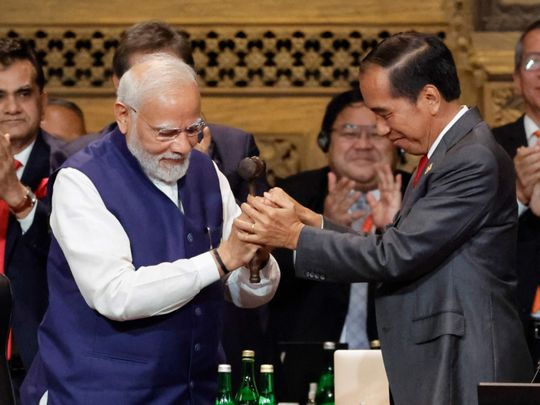
NEW DELHI: India opened its G20 presidency on Thursday with Prime Minister Narendra Modi calling for an end to war.
New Delhi and Moscow have ties dating back to the Cold War, and Russia remains by far India’s biggest arms supplier.
India has shied away from explicit condemnations of Russia over the war despite its economy being stung by the soaring oil and commodities prices that followed.
Modi has pressed Russian President Vladimir Putin to end the conflict, including at a face-to-face meeting on the sidelines of a major regional summit in September.
He reiterated that call in an article outlining India’s ambitions for the G20 forum - of which Russia is a member - released by the government and published by the Telegraph newspaper in Britain.
“Today, we do not need to fight for our survival - our era need not be one of war. Indeed, it must not be one!” Modi wrote.
The war on Ukraine, a country known as the “breadbasket of Europe”, has periodically disrupted grain shipments and raised the spectre of a global food crisis.
Modi said India would “seek to depoliticise the global supply of food, fertilizers and medical products, so that geo-political tensions do not lead to humanitarian crises”.
“As in our own families, those whose needs are the greatest must always be our first concern.”
New Delhi has long walked a tightrope in its relations with the West and Moscow - and the Russian attacks on Ukraine have highlighted the difficulty of that balancing act.
It has repeatedly brushed off calls from Washington to condemn Moscow, despite pursuing greater security ties with the United States.
Putin visited New Delhi last year, bear-hugging Modi and hailing India as a “great power” as the two men bolstered military and energy ties.
The Asian giant of 1.4 billion people is also a major consumer of Russian oil, ramping up discounted purchases in the wake of a Western embargo.
India’s year-long G20 presidency will be “inclusive, ambitious, decisive, and action-oriented”, PM Modi said, adding that it will encourage an honest conversation on mitigating risks posed by weapons of mass destruction and enhancing global security.
The government also seeks to build consensus on debt sustainability and creating disaster and climate-resilient infrastructure. India’s G20 plans also include a special focus on startups and bridging the digital divide.
The country will host as many as 200 meetings across the country over the next one year, with the first one being held in Udaipur later this week. The G20 Summit will be organised in New Delhi in September 2023.
The G20 platform seeks to forge common ground on key issues among prominent countries, External Affairs Minister S Jaishankar said. “Our endeavor as the G20 chair is to make that consensus more relevant through wider consultation,” he said.
Starting December 1, 100 monuments across the country, including UNESCO world heritage sites, will be lit up highlighting the G20 logo for a week.
Prime Minister Narendra Modi unveiled the logo and the theme for India’s G20 presidency last month. The logo depicts a lotus flower and a globe, while the theme for India’s G20 presidency is -”One Earth, One Family, One Future” - which highlights its commitment to ‘Vasudhaiva Kutumbakam’ (world is one family).
India was handed over the presidency of the influential bloc at the closing ceremony of the previous G20 summit in Bali that was hosted by Indonesia on November 15 and 16.
The G20 or Group of 20 is an intergovernmental forum of the world’s major developed and developing economies. The group comprises Argentina, Australia, Brazil, Canada, China, France, Germany, India, Indonesia, Italy, Japan, the Republic of Korea, Mexico, Russia, Saudi Arabia, South Africa, Turkey, the UK, the US and the European Union.
The member countries represent around 85 per cent of the global GDP, over 75 per cent of the global trade, and about two-thirds of the world population.












